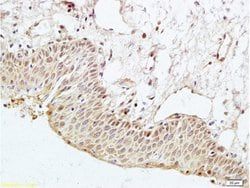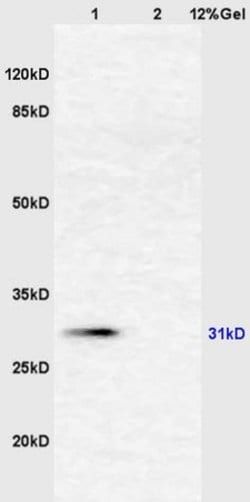SPINK1 Rabbit anti-Human, Polyclonal, Bioss
Manufacturer: Bioss
Select a Size
| Pack Size | SKU | Availability | Price |
|---|---|---|---|
| Each of 1 | 50-198-5008-Each-of-1 | In Stock | ₹ 38,381.25 |
50-198-5008 - Each of 1
In Stock
Quantity
1
Base Price: ₹ 38,381.25
GST (18%): ₹ 6,908.625
Total Price: ₹ 45,289.875
Antigen
SPINK1
Classification
Polyclonal
Conjugate
Unconjugated
Gene
SPINK1
Gene Alias
Calcium transport inhibitor; Caltrin; ISK1; P12; Pancreatic secretory trypsin inhibitor; Pancreatic secretory trypsin inhibitor II; pancreatic secretory trypsin inhibitor type II (PSTI-II); PCTT; Prostatic secretory glycoprotein; PSTI; PSTI-II; serine peptidase inhibitor, Kazal type 1; serine peptidase inhibitor, Kazal type 3; Serine protease inhibitor Kazal-type 1; Serine protease inhibitor Kazal-type 1-like; Serine protease inhibitor Kazal-type 3; serine protease inhibitor, Kazal type 1; serine protease inhibitor, Kazal type 3; Spink 3; SPINK1; Spink1l; Spink3; TATI; TCP; Tumor-associated trypsin inhibitor
Host Species
Rabbit
Purification Method
Protein A
Regulatory Status
RUO
Gene ID (Entrez)
6690
Content And Storage
-20°C
Form
Liquid
Applications
Immunofluorescence, Immunohistochemistry (Paraffin)
Concentration
1 μg/mL
Formulation
PBS with 1% BSA, 50% glycerol and 0.09% sodium azide; pH
Gene Accession No.
P00995
Gene Symbols
SPINK1
Immunogen
KLH conjugated synthetic peptide derived from rat SPINK1.
Quantity
100 μL
Primary or Secondary
Primary
Target Species
Human
Product Type
Antibody
Isotype
IgG
Description
- This is a trypsin inhibitor, its physiological function is to prevent the trypsin-catalyzed premature activation of zymogens within the pancreas
- Defects in SPINK1 are a cause of pancreatitis (PCTT) [MIM:167800]
- A disease characterized by the presence of calculi in pancreatic ducts
- It causes severe abdominal pain attacks
- Defects in SPINK1 are the cause of susceptibility to tropical calcific pancreatitis (TCP) [MIM:608189]
- TCP is an idiopathic, juvenile, nonalcoholic form of chronic pancreatitis widely prevalent in several tropical countries
- It can be associated with fibrocalculous pancreatic diabetes (FCPD) depending on both environmental and genetic factors
- TCP differs from alcoholic pancreatitis by a much younger age of onset, pancreatic calcification, a high incidence of insulin dependent but ketosis resistant diabetes mellitus, and an exceptionally high incidence of pancreatic cancer.


